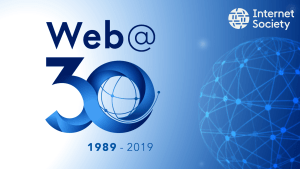WEBCAST JUL 15 – The Royal Society – Celebrating the 50th Anniversary of the Internet
 On Monday July 15 2024 from 1pm-7pm BST (12:00-18:00 UTC) The Royal Society and the Association for Computing Machinery (ACM) will be Celebrating the 50th Anniversary of the Internet in London, UK. The event will be opened by the co-inventor of the Internet Dr Vint Cerf and will feature a series of panels with eminent speakers that will look back at what the Internet has achieved in the last fifty years and focus on the next generation of the Internet and AI, and is supported by the Web Science Trust, People-Centered Internet, Digital Enlightenment Forum, The Digital Humanism Initiative, and the Web Science Institute, University of Southampton, UK.
On Monday July 15 2024 from 1pm-7pm BST (12:00-18:00 UTC) The Royal Society and the Association for Computing Machinery (ACM) will be Celebrating the 50th Anniversary of the Internet in London, UK. The event will be opened by the co-inventor of the Internet Dr Vint Cerf and will feature a series of panels with eminent speakers that will look back at what the Internet has achieved in the last fifty years and focus on the next generation of the Internet and AI, and is supported by the Web Science Trust, People-Centered Internet, Digital Enlightenment Forum, The Digital Humanism Initiative, and the Web Science Institute, University of Southampton, UK.
PROGRAMME (All times BST = UTC+1)
13:00 Welcome
Areeq Chowdhury, Head of Policy, Data and Digital Technologies, The Royal Society
Prof. Yannis Ionnidis, President, ACM
Prof. Dame Wendy Hall, University of Southampton / Web Science Trust
13:05 Opening Speech / Conversation
Dr. Vint Cerf, Vice President / Chief Internet Evangelist, Google
Mei Lin Fung, Chair / Co-founder, People-Centred Internet
13:45 Panel 1: The Internet as an Infrastructure
Prof. Andrew Ellis, Aston University
Prof. Dimitra Simeonidou, University of Bristol
Maarten Botterman, Board Director, ICANN
Prof. Gaven Smith, The University of Manchester
Chair: Sir David Payne, Professor of Photonics, University of Southampton
15:15 Panel 2: The Internet as a Facilitator of Opportunity
Doreen Bogdan-Martin, Secretary General, International Telecommunications Union (ITU)
Prof. Jim Hendler, Rensselaer Polytechnic Institute (RPI)
Alan Kay, Computer Science Pioneer
Prof. Bitange Ndemo, Kenya’s Ambassador to Belgium and EU
Chair: Mei Lin Fung, Chair / Co-founder, People-Centred Internet
Respondent: Dr. Vint Cerf
16:15 Panel 3: The Internet and Society
Prof. Noshir Contractor, Northwestern University
Prof. Victoria Nash, Oxford Internet Institute
Prof. Sir Nigel Shadbolt, University of Oxford
Prof. Hannes Werthner, Vienna University of Technology
Chair: Dame Wendy Hall, Regius Professor of Computer Science, University of Southampton / Trustee, Web Science Institute / Director, Web Science Trust
Respondent: Dr. Vint Cerf
17:15 Closing Remarks
Dr. Vint Cerf, Vice President / Chief Internet Evangelist, Google
LIVESTREAM https://youtu.be/ltF5uWB9Wg0
REGISTER VIA EVENTBRITE https://bit.ly/4cW77lZ (Q&A)
REAL TIME TEXT https://bit.ly/463OZUV
TWITTER #i50 @royalsociety @TheOfficialACM @PCI_Initiative @vgcerf @websciencetrust Digital Enlightenment Forum @DigHumTUWien @sotonWSI
MASTODON #i50 @mastodon.acm.org











Reply